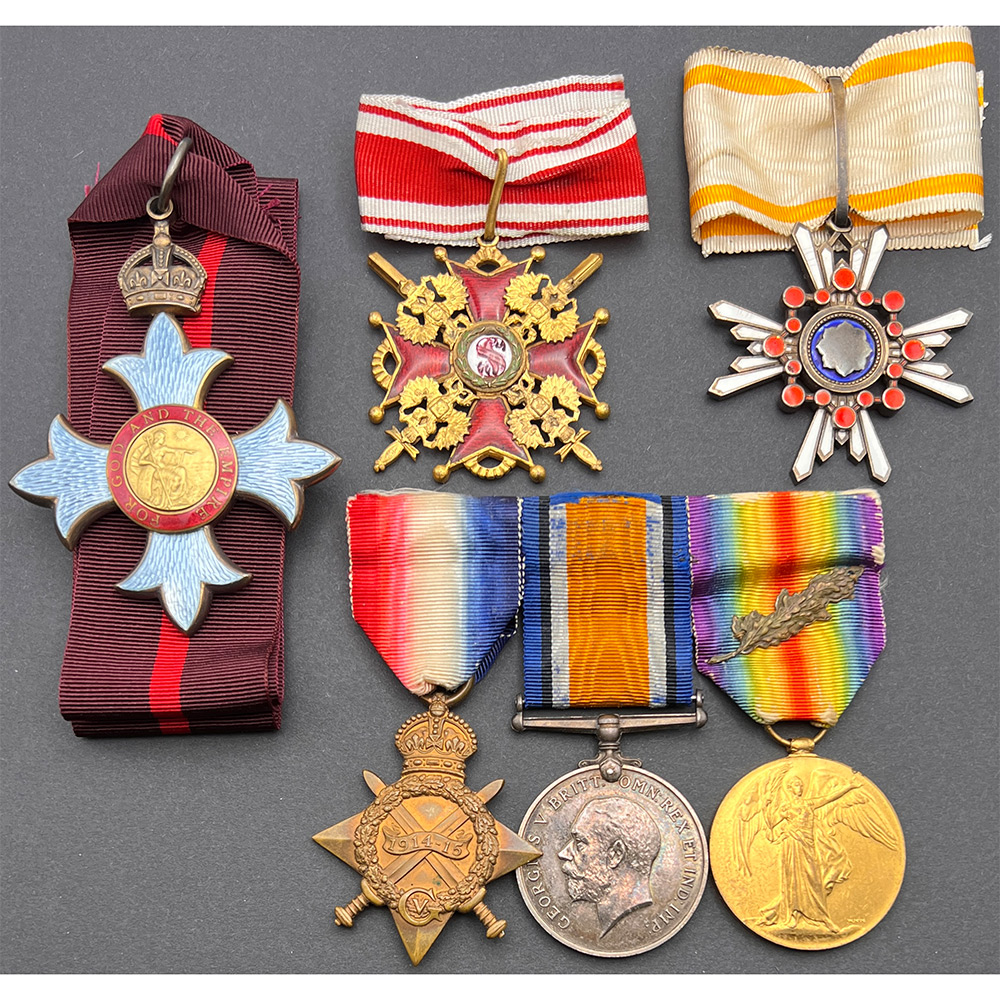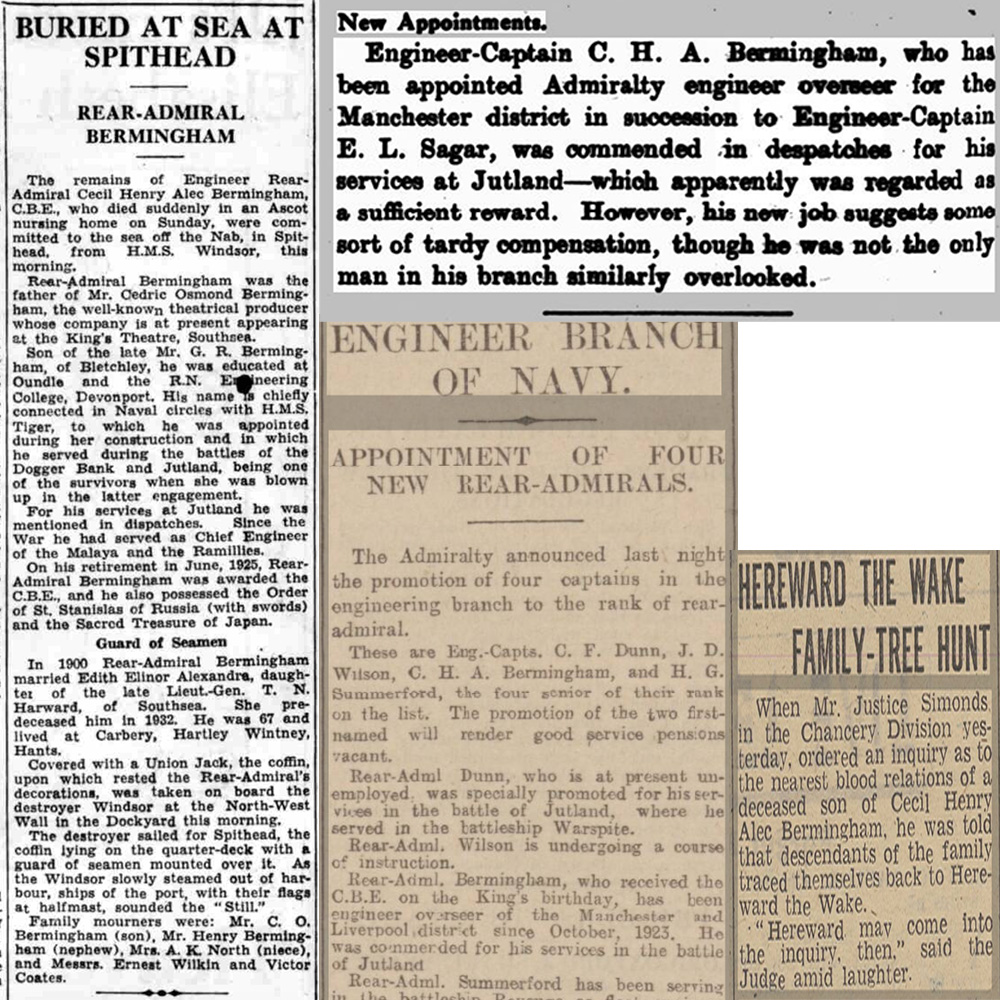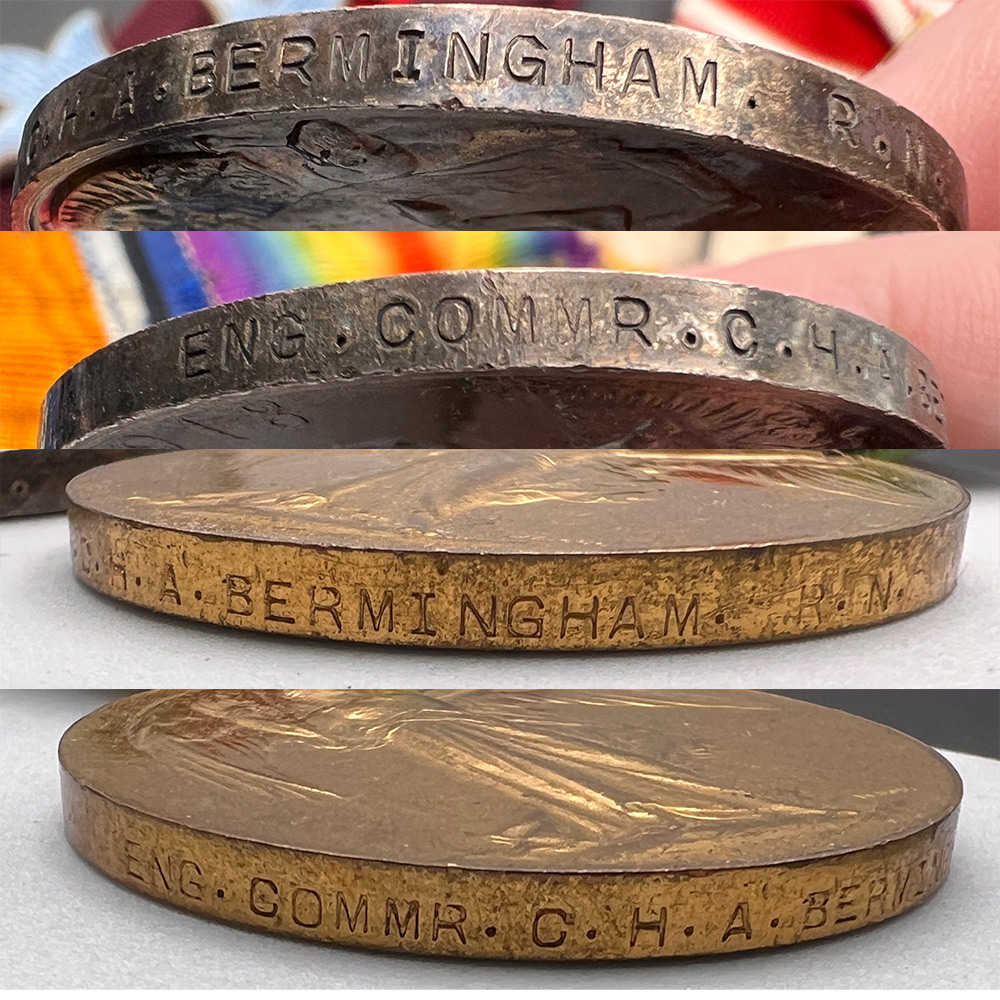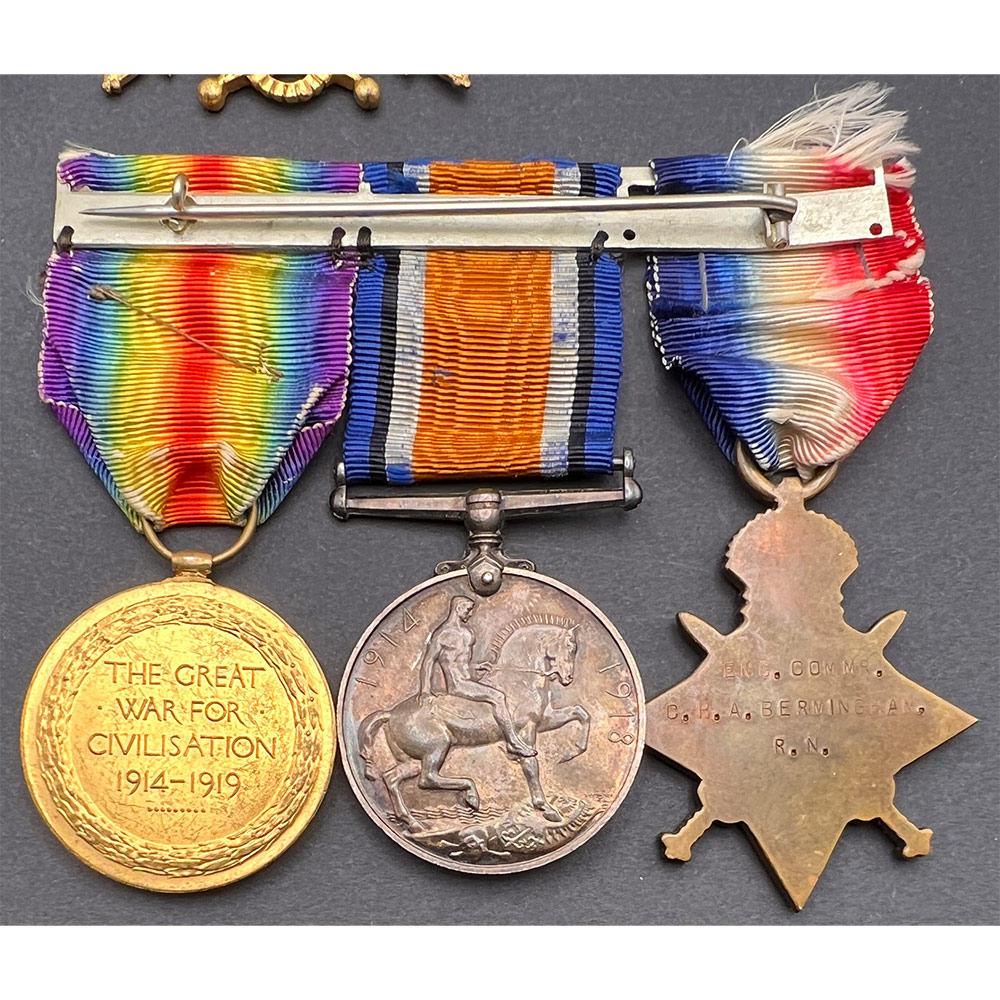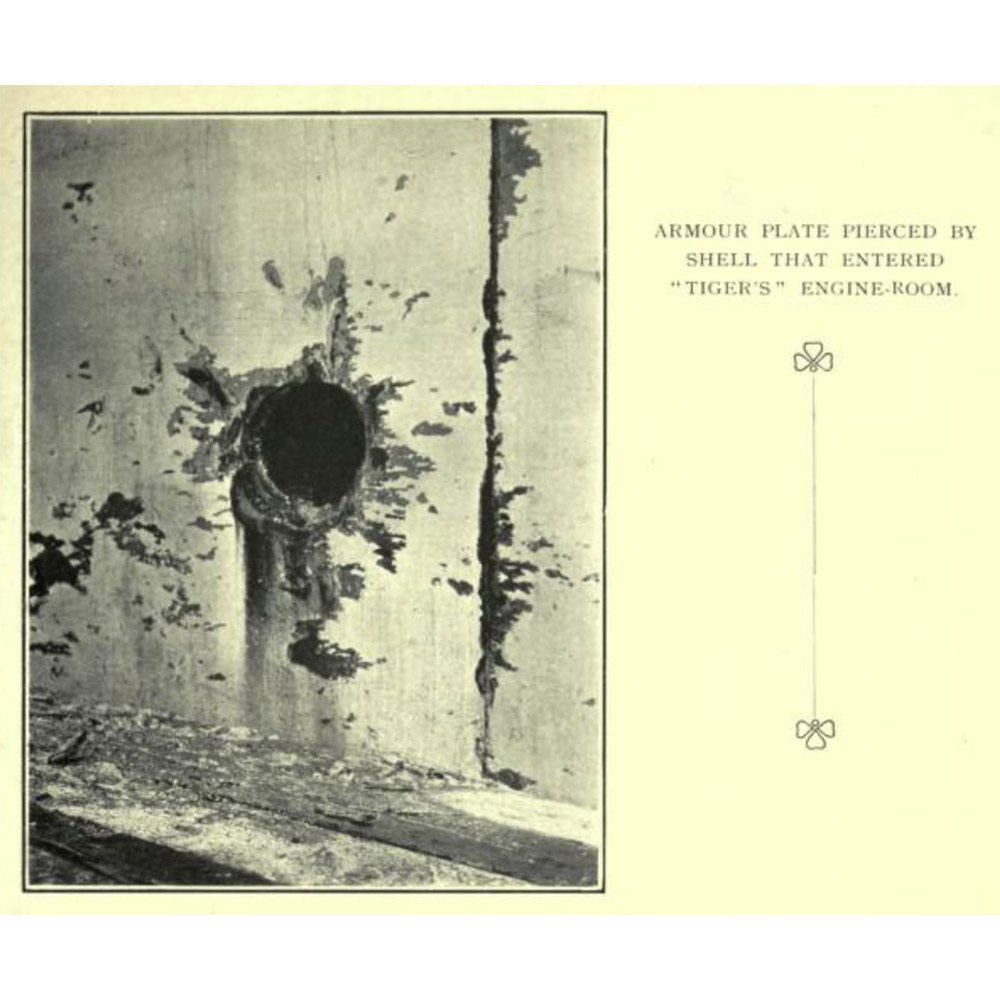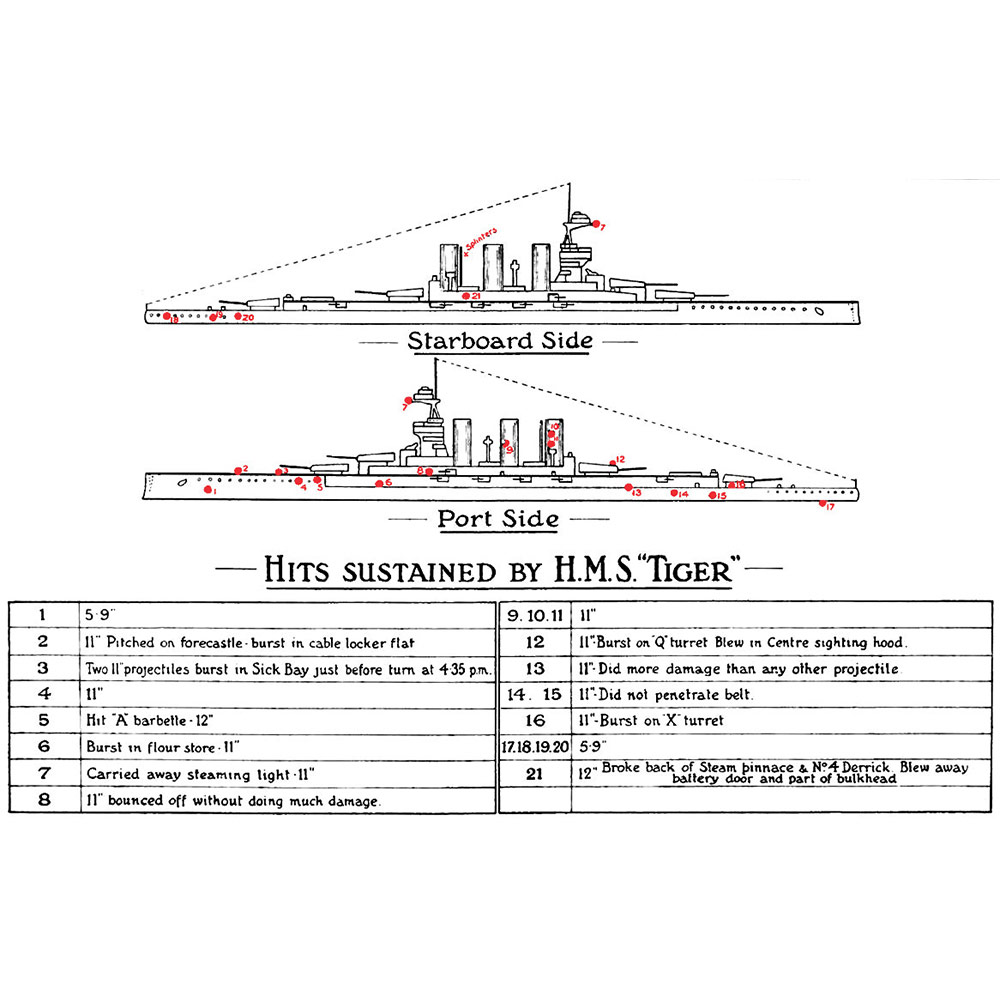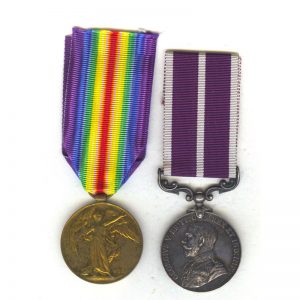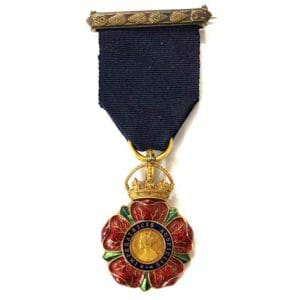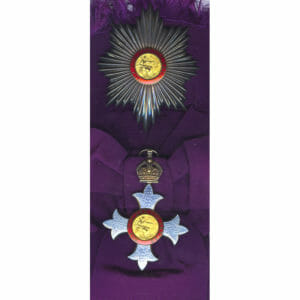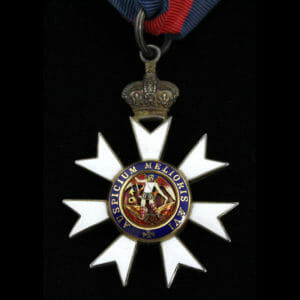Description
Commander of the Order of the British Empire, C.B.E. Neck Badge, 1914-15 Star, British War and Victory Medal, Japan Order of the Sacred Treasure, 3rd Class Neck Badge, Russia Order of St Stanislaus, 2nd Class with Swords, Bronze Gilt Wartime example.
C.B.E. Neck Badge, is a Britannia 1st Type, with Military Ribbon, one flake to lower middle arm.
Japanese Order of the Sacred Treasure, a good silver gilt example with Kanji Stamps on reverse and Kanji manufacturer mark on bottom arm.
Russian Order of St Stanislaus, Bronze Gilt example, circa 1916-17 production, with Makers mark and “K” to reverse arm, appears to read “Eduard” in Cyrillic, usual manufacturers marks for wartime issue before the collapse of the Government in 1917.
1914-15 Star Trio, all swing mounted for wear on silk ribbons with sew-on mention in despatches oak leaf.
1914-15 Star officially impressed: “ENG. COMMR. C.H.A. BERMINGHAM, R.N.”
British War and Victory Medal both officially impressed: “ENG. COMMR. C.H.A. BERMINGHAM. R.N.”
Provenance: last sold in DNW Auctions on 20th June 2013, only the 1914-15 Star Trio without Orders, Hammer Price £1736 including premiums.
C.B.E. Military Division awarded in the 1925 King’s Birthday Honours, 3rd June 1925.
Promoted to Engineer Rear Admiral June 1925.
Mentioned in Despatches, “Commended for service in the Battle of Jutland on 31.5.1916”, London Gazette 15th September 1915.
Russian Order of St Stanislaus, confirmed by Admiralty on 5th June 1917: “The following decorations were conferred by the Russian Government on Officers of the Grand Fleet for distinguished service rendered in the Battle of Jutland”,
Japan, Order of the Sacred Treasure, 3rd Class, confirmed Admiralty, 29th November, 1918.
“The following decorations have been conferred by the Allied Powers on Officers of the British Naval Forces for Distinguished Services rendered during the war:”
“His Majesty, the Emperor of Japan, Order of the Sacred Treasure, 3rd Class.”
Engineer Rear Admiral Cecil Henry Alec Bermingham was during World War 1, the Engineer Commander in charge of the Engine Room of HMS Tiger, a post he had occupied since the building of the ship in 1912.
He would take part in both the Battle of Dogger Bank on 23rd January 1915 as well as the Battle of Jutland on 31st May – 1st June 1916.
According to his Obituary, when his casket was dropped off at Sea: “His name is chiefly connected in Naval circles with HMS Tiger, to which he was appointed during her construction and in which he served during the Battles of Dogger Bank and Jutland, being one of the survivors when she was blown up in the latter engagement. For his services at Jutland he was mentioned in despatches.”
During the battle the Tiger sustained numerous hits from the German Ships, and as recounted in the Personal Narrative of the Engine Room, she came very close to being sunk, when a shell burst into the engine room: “Had the base of the projectile struck the pipe instead of the bracket, the whole engine-room staff would have been wiped out, and the ship completely disabled until the steam to the damaged piping was shut off, an operation which would probably have involved the vessel being destroyed by concentrated enemy fire as she drifted helplessly out of the line.”
After the firing settled towards 11pm: “The interval was spent in frenzied work on repairs, and some of the scenes between decks in the vicinity of shell burst beggar description. But the most marked feature of the action that came under my personal observation was the coolness and discipline of the engine room and artisan staff generally, under the most trying conditions, and their initiative and readiness of resource in effecting apparently impossible repairs in emergencies.”
For his services at the Battle of Jutland, Engineer Commander Bermingham was mentioned in despatches in the London Gazette of 15th September 1916, “The Jutland Despatch”.
An award from Russia for Jutland of the St Stanislaus, followed afterwards during 1917, and a further decoration was bestowed upon him by the Emperor of Japan, the Order of the Sacred Treasure during 1918.
The Truth Newspaper, 17th October 1923, records his new job:
“Engineer-Captain C.H.A. Bermingham, who has been appointed Admiralty Engineer Overseer for the Manchester District in succession to Engineer-Captain E.L. Sagar, was commended in despatches for his services at Jutland – which apparently was regarded as a sufficient reward. However, his new job suggests some sort of tardy compensation, though he was not the only man in his branch similarly overlooked.”
Promotion to Rear Admiral, Western Morning News 11th June 1925:
“ENGINEER BRANCH OF THE NAVY, APPOINTMENT OF 4 NEW REAR-ADMIRALS
The Admiralty announced last night promotion of 4 Captains in the Engineering Branch to the rank of Rear-Admiral.
These are… C.H.A. Bermingham.
…Rear Adml Bermingham, who received the CBE on the King’s Birthday. has been Engineer Overseer of the Manchester and Liverpool District since October 1923. He was commended for his services in the Battle of Jutland.
PERSONAL LIFE
Cecil Henry Alec Bermingham, was born in late 1870 in St Pancras, London.
The son of George B. Bermingham and Annie R. Bermingham.
His family are said to have descended from “Hereward the Wake”, following the death and probate of his son, an amusing article was placed in the London Daily Mirror, 12th December 1942:
“HEREWARD THE WAKE FAMILY TREE HUNT
When Mr Justice Simonds in the Chancery Division as to the nearest blood relations of a deceased son of Cecil Henry Alec Bermingham, he was told that descendants of the family traced themselves back to Hereward the Wake.
‘Hereward may come into the inquiry then’, said the judge amid laughter.”
As a young boy he was educated aged about 10 at Oundle School, in Oundle, Northamptonshire.
During 1900 he married his wife Edith Elinor Alexandra Bermingham, born 1878 in India.
She was born to Lieute General T.N. Harward, of Southsea.
He had a son, in 1902, named Cedric Osmond Bermingham, who was a well regarded Stage Manager in the Theatre Business in London. “His son, Mr C.O. Bermingham, well known as a Theatrical Producer, whose repertory company are now at the King’s Theatre, Southsea.”
He died during May 1938 in Ascot, his burial at sea was announced in his obituary in the Plymouth Evening News, 31st May 1938.
In true Naval fashion, he was taken on board HMS Windsor, in his coffin and “committed to the sea off the Nab, in Spithead”, “Covered with a Union Jack, the Coffin, upon which rested the Rear-Admiral’s decorations, was taken on board the destroyer Windsor at the North-West Wall in the Dockyard this morning.
The destroyer sailed for Spithead, the coffin lying on the quarter-deck with a guard of seamen mounted over it. As the Windsor slowly steamed out of harbour, ships of the port, with their flags at halfmast, sounded the ‘Still.’ “
He certainly was a classic character, he was brought into court to give evidence in a car accident and caused much amusement at his refusal to use anything but Nautical terminology to describe the situation:
“A Retired Admiral described in Nautical terms a collision between a Trades Van and a Colonel’s Car to the Odiham (Hants.) Magistrates.
This is how Admiral Cecil Henry Bermingham, of Hartley Wintney, gave his evidence:
‘I was astern of a big lorry and astern of me was a motor cyclist. We were doing a steady 16 knots. As I pulled out I saw the van pull right across the bows of the Colonel’s car. The bows of the Colonel’s car were smashed and the bows of the van were not too good either.’ “
NAVY CAREER
25th July 1891: “Cecil Bermingham R.N. (P.A.E.) having successfully passed out of the R.N.E. College, Devonport, is appointed to the Bellona (Western Fleet) for the forthcoming manoeuvres.”
He next appears on HMS Crocodile, as a Probationary Assistant Engineer, dated 12th September 1891.
The following would appear to be the unfortunate end of his service on the ship: “Crocodile’s last voyage began at Bombay in October 1893. On 3rd November, as she was approaching Aden, the high pressure steam cylinder exploded and the ship came to a halt. The next day she was towed to an Anchorage near Aden. Most of the soldiers and their families were brought home on other ships. Crocodile eventually arrived back at Portsmouth on 30 Dec 1893, having travelled only using the low pressure steam cylinder, and was not further employed for trooping.”
He then served on HMS Archer from 29th January 1894, during this time promoted to Engineer from 1st January 1897.
During this time HMS Archer, was stationed on the China Station, when the First Sino Japanese War of 1894 broke out.
As they were available in the region, on the even of the outbreak of war, the Japanese Forces had surround Seoul, Korea.
HMS Archer landed an armed party of 30 Bluejackets in order to protect the British Consul-General after a confrontation occurred between him and the Japanese troops.
HMS Vernon, from 27th August 1898.
HMS Illustrious, from October 1901
HMS Racehorse, from 20th June 1905
HMS Vindictive from 2nd December 1908.
During this time promoted to Engineer Commander, with seniority 1st January 1909.
HMS Warrior, 6th May 1910, as Engineer Commander.
HMS Prince of Wales from 15th May 1912.
HMS Tiger, from September 1912 until about January 1918.
During this period he was the original Officer in Command of the Engineering Section of the ship whilst she was being built.
He saw service through the war from 1914 until January 1918 on the Tiger, including Dogger Bank in Jan 1915 and Jutland in May-June 1916.
HMS President from 8th January 1918, for misc services at the Admiralty.
HMS Malaya. 23rd November 1918.
Promoted to Engineer Captain, Seniority 23rd July 1919.
Department of Engineer in Chief, Engineer Inspector from 17th February 1923 (Borne in President)
Engineer Overseer for Manchester and Liverpool Districts from 15th October 1923.
Appointed CBE in the 1925 King’s Birthday Honours, and that same month of June 1925, Promoted to the rank of Rear Admiral.
Narrative of an Officer in the Engine-Room of H.M.S. Tiger, being a personal account from the period from “an Officer”, all the accounts for the book were anonymised, it is believed that Bermingham was the author, he was also tasked with submitting to the Admiralty the Official Account of the event from his perspective in Command of the Engine Room, but it does give an interesting first hand account of the day:
“I think the outstanding impression that remains regarding the Jutland Battle is the suddenness and unexpectedness of the whole incident. After one and a half years’ service with the First Battle Cruiser Squadron, with almost weekly sweeps into German waters, the experience had become almost monotonous, as these cruises, except for the Dogger Bank brush and a sight of an occasional Zeppelin, were almost without incident.
On 31st May, 1916, one of these cruises was in progress, and although high authorities may have known that something more than usual was on the tapis, the generality of officers and men were certainly unaware that anything was likely to happen. They were disillusioned with dramatic suddenness. About 3.45 p.m. (summer time) word was passed that enemy cruisers were in sight, and it was generally believed at first that a portion of the enemy light forces had been caught napping whilst out on a raiding expedition. Action stations were sounded, and hardly had everyone settled at their post-my particular station was the port turbine-room- when word was passed that enemy battle cruisers were in sight, and that “Der Tag” was imminent. The accuracy of the prophecy was promptly confirmed by the firing of our big guns, and by the thuds and crashes of heavy projectiles, which told us that we were under fire of guns of con- siderable calibre. Previous experience enabled even those cooped up between decks to judge fairly accurately, not only which of our own guns were firing, but also the general location of the enemy hits on us.
Very early in the action an incident occurred which came very near terminating the career of the Tiger. A heavy thud, followed by a deafening report immediately overhead, intimated that a heavy shell had penetrated the side armour and had burst inboard. The base of the shell, forced out intact by the explosion, penetrated the upper deck and the armoured deck, and punched a neat hole in the steel bracket supporting the main steam pipe on the forward bulkhead of the port engine-room, and remained balanced overhead. Had the base of the projectile struck the pipe instead of the bracket, the whole engine-room staff would have been wiped out, and the ship completely disabled until the steam to the damaged piping was shut off, an operation which would probably have involved the vessel being destroyed by concentrated enemy fire as she drifted helpless out of the line.
The immediate consequences, however, were quite serious enough. The shell bursting in the ammunition passage killed a dozen men, set fire to the ready-use cordite in the passage, rendering it necessary to flood the midships 6-inch magazine, cut through the fresh and salt water mains, and finally the base of the shell, in penetrating to the engine-room, severed the H.P. air pressure ring main, giving the impression by the hiss of escaping air that the steam pipe itself was damaged. No examination could be made to locate the trouble, as through the hole in the deck were pouring the fumes from the burning cordite, and the engine-room was immediately filled with dense smoke, which rendered it impossible to see. Gauges, telegraphs, etc., could only be examined by the aid of flash lights and electric torches at intervals.
To add to the difficulties, water from the severed mains poured through the damaged deck overhead, over the separators, and over the main steam pipes on to the platform, so that the men stationed there were subjected as the ship rolled, to alternate cascades of cold and semi-boiling water. Attempts were made to proceed to the scene of the explosions from the for- ward end of the engine-room, but it was found that the forward escape was blocked by wreckage. Access was finally obtained through the escape at the after end of the engine-room, and the depleted repair party, many of whom had been killed or put out of action by the explosion and fumes, set to work to plug the damaged piping in the passages.
In the engine-rooms matters gradually improved. As the cordite burnt out the smoke clouds became less dense, and matters assumed a more normal aspect. The roar of the heavy guns continued steadily the while, informing all that, whatever the general state of affairs were in the fleet, the Tiger was keeping her end up, while frequent bursts of firing from our 6-inch secondary armament indicated the approach of enemy destroyers or light craft. From time to time messages of varying import reached us from the upper deck. The loss of the Queen Mary was marked by the filling of engine-rooms with dense clouds of smoke, as the Tiger steamed through the area where she had been, and occasional lulls enabled hurried expeditions to be made to the scene of serious damages for essential repairs to be organised and arranged for. Men in isolated posts were visited and occasional exchanges of posts arranged.
Eventually the firing gradually died away, and towards 11 p.m. word was passed that the immediate action was ended, but that action stations would be resumed at dawn, or earlier. The interval was spent in frenzied work on repairs, and some of the scenes between decks in the vicinity of shell bursts beggar description. But the most marked feature of the action that came under my personal observation was the coolness and discipline of the engine-room and artisan staff generally, under the most trying conditions, and their initiative and readiness of resource in effecting apparently im possible repairs in emergencies.”
